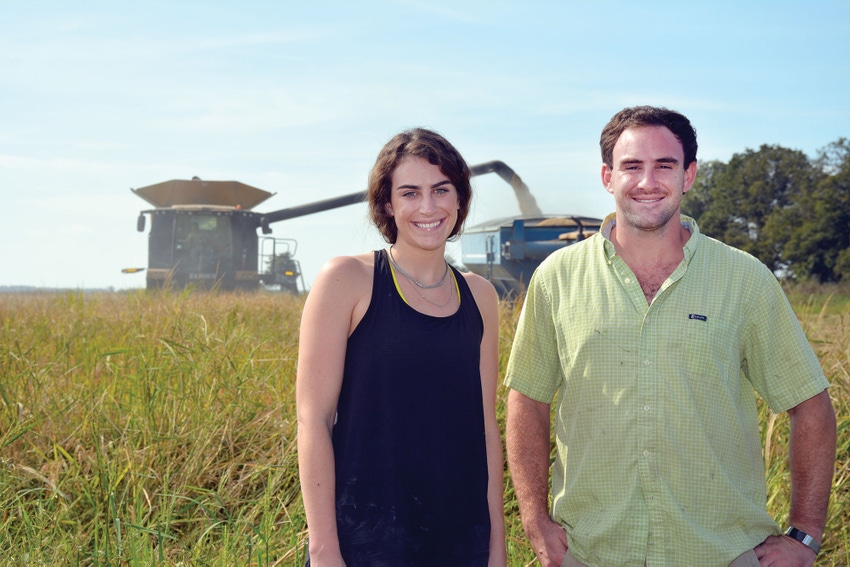
Two Brooks Rice Farm in Sumner, Miss., embraces sustainability.
The process includes more than basic conservation on the rice and soybean farm (though those efforts are numerous and effective) and involves working with conservation groups and food industry representatives and marketing specialty rice through retail and food distributors.
Abbey Wagner, 24, and her brother Lawrence, 25, representing the eleventh generation of the family farm, have taken on key management roles on the farm their father, Mike, started in 1992.
The operation includes about 2,000 acres of rice and 1,000 acres of soybeans. The rice operation includes conventionally grown long-grain rice as well as acreage devoted to “Eco-Farming rice.” They also produce specialty rice varieties — Missimati (Mississippi Basmati), Jasmine and red and black rice. The specialty rice is processed through the Two Brooks mill and marketed through a few retail outlets and food distributors.
Abbey explains that their father grew up on a farm in Missouri, wanted to continue farming, but his dad said the land there was no longer profitable. He moved to Mississippi and rented acreage in Bolivar County until he could find land close to home. He bought the 3,000-acre Two Brooks farm in 1992.
“It is lucky to find that much acreage in one unit,” explains Abbey.
She also explains that Mike always wanted to add specialty rice and a marketing opportunity to the operation. “He wanted to do that for ten years,” she says. “He saved up money to build the mill.”
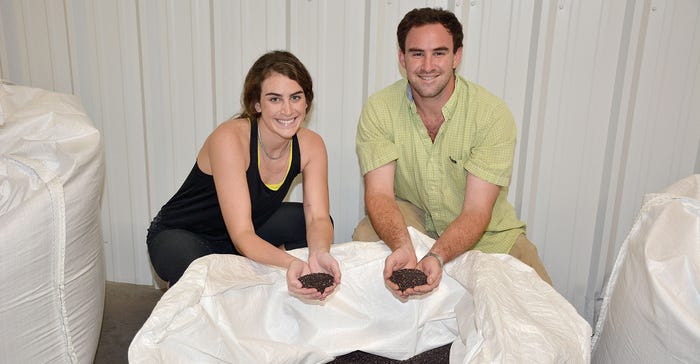
Siblings Abbey and Lawrence Wagner show ecologically grown black rice they process and sell at Two Brooks Farm.
They built the mill in 2014. “Dad had planned for about ten years to add more varieties. That’s been Lawrence’s project,” Abbey says. “When he graduated from college (Mississippi State University, business and ag economics), he started working in our rice mill. We mill about 15 percent of the rice we grow.”
“We run all of our specialty rice through our mill,” says Lawrence.”
“We’re running the mill every other week,” says Abbey. “We hope to run it full-time as demand increases.”
They say markets have been good for Basmati, Jasmine and the red and black rice varieties. “The black rice has as many anti-oxidants as a handful of blueberries,” Abbey says.
She handles marketing, making use of her marketing degree from Delta State University.
The operation began as a typical rice farm, long-grain rice (2,000 acres) and soybeans (about 1,000 acres), and some Basmati rice. They added Jasmine and then black and red rice.
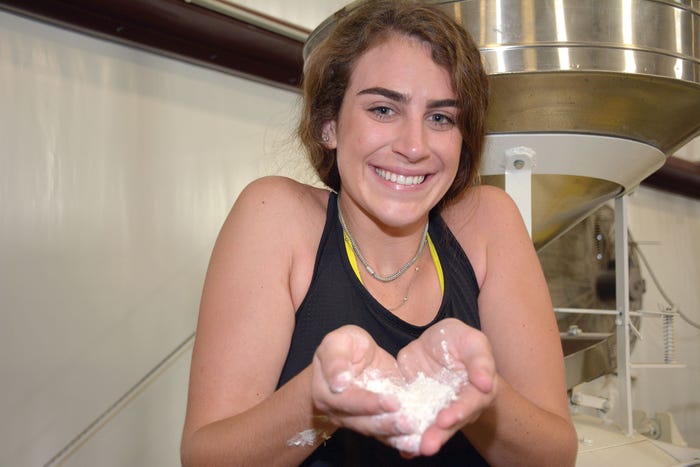
Rice flour is one of the specialty products Two Brooks Farm offers through their rice mill. Abbey Wagner pulls a handful from the flour mill.
“The bulk of our acreage is still long-grain rice and soybeans,” Abbey says. Soybeans are non-GMO and typically bring a premium.
“We have 1,000 acres of conventional rice,” adds Lawrence. “We have another 1,000 acres of Eco-Farming rice. Eco rice is not totally organic,” he explains.
They use zero grade fields for eco rice and rarely put equipment on the land. They also maintain water on those fields year-round, except for harvest. Following harvest, they don’t pump water back onto the fields but allow them to flood with rainfall.
“We see ducks and geese in greater numbers because of the eco fields,” he says.
The waterfowl are good for the rice. “We found that those fields had too much nitrogen,” he explains. “We had some lodging issues, so we cut nitrogen back by about half.” He says ducks and geese also eat weed seeds, reducing the amount of herbicide they need.
“We see a lot of wildlife on the eco fields.”
They fly on seed and herbicide in the eco-farmed fields. “We had to use a ground rig some this year,” Lawrence says, because of a late start. “It stayed cold too long. If we put rice seed into cold water, it doesn’t do well. We put on a little herbicide early in the season to control small weeds until the crop forms a canopy.”
He says 500-acre zero grade blocks have three levels. They pull water from the Quiver River and the flood moves from one block and into the other two until all three are flooded. It stays flooded until harvest. Some years, according to the Two Brooks website (https://www.twobrooksfarm.com/), natural rainfall is all that’s necessary, saving water and the energy to pump it.
“We reuse tailwater, using a lift pump to get surface water to other parts of the farm,” Lawrence says. They preserve the aquifer, relying on surface water and rainfall.
Saving Water
Lawrence says the eco farming practice uses significantly less water than conventional or straight levee production. Conventional practices will use 36 acre-inches of water. Straight levees use 22 acre-inches. “The zero grade uses from 16 to 18 acre-inches. Sometimes we use no more than 6 to 12 acre-inches.”
They have worked with Ducks Unlimited and Mississippi State University to enhance waterfowl habitat and to improve the soil. “Mississippi State works with organic matter,” Lawrence says. “Eco farming versus conventional shows a 6 percent improvement in organic matter.”
He says recommendations from Ducks Unlimited include “stuff we were doing already. It fits in naturally.”
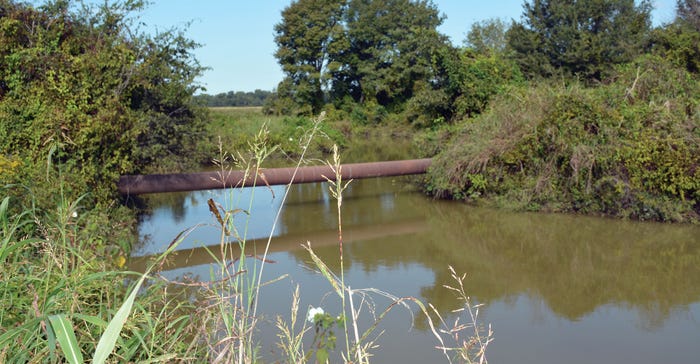
Water conservation plays a significant role in Two Brooks Farm’s sustainability program. The farm also works with Ducks Unlimited to enhance waterfowl habitat.
He says the eco practices include fields that have been in rice continuously for 10 to 20 years. “We are able to maintain yields.”
He says eco-farm yields are comparable to conventional. “We typically cut from 160 to 170 bushels per acre, on a par with conventional.”
The Two Brooks website also notes that continuous rice also acts as a filter to limit runoff and to “make sure the water that leaves the field is at least as clean as it was when it entered, especially free of silt and fertilizer.”
Specialty rice (single estate rice) yields are also comparable. They grow 40 acres each of red and black rice but plant two plots each, “just in case we lose one. We harvest at separate times.”
Lawrence says the specialty rice can make life “miserable,” because they must prevent cross contamination.
“We have to clean planters, combines, grain carts, and every nook and cranny in the mill after each variety,” he says. “We spend a half day cleaning after we combine one variety and before we start on another.”
Keeping weedy red rice out of the specialty red rice is hard, hot work, says Abbey. “I’ve helped rogue it out by hand.”
Sustainability Message
Abbey says the eco-farming operation and the specialty rice markets fit into their sustainability message. “A lot of consumers now want different products,” she says. “And many want to know where their food comes from and how it was grown.”
She brings in a group of chefs, mostly from the South, but has had interest from New York, to see the operation, sample different rice products and enjoy the rural setting, including a duck hunt. “We do that twice a year,” she says.
They have a few retail customers in nearby towns and are working with several food distributors. “We hope to get more distributors,” Lawrence says.
“We also hope to capture some of the market from imports, such as imported Basmati rice.” He says the Basmati they grow, “Missimati”, is an American Basmati but has the same aroma and taste as Indian Basmati rice.
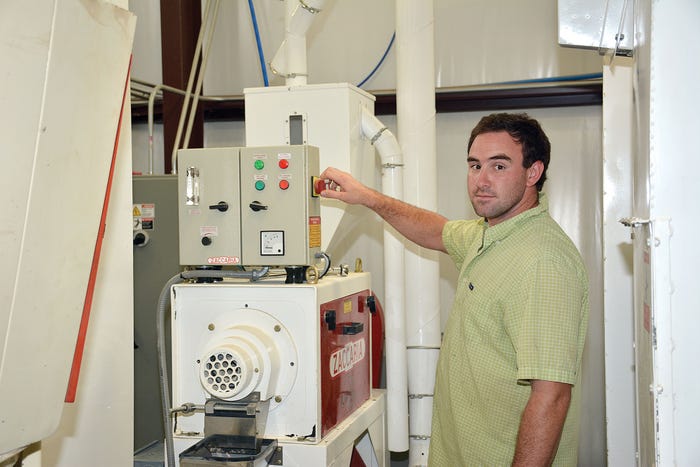
Lawrence Wagner checks controls in the Two Brooks Farm rice mill, where they process specialty rice, including red, black, Basmati and Jasmine varieties.
They also hope to expand their specialty rice market. “We have some things to do first,” Abbey says. “We need to work on sanitation issues and just learn what other regulations we need to know to expand the market.”
Lawrence says transportation from the remote farm location is an issue to work through.
“We want to produce a larger volume of our own milled rice,” he says. “We are working toward that.”
Lawrence and Abbey say Two Brooks is dedicated to the mission spelled out on their website.
“Our family believes you should not have to choose between the needs of nature and those of mankind, and our unique rice cultivation system conscientiously attends each by balancing nature with needs.”
To learn more about the conservation, marketing and charitable aspects of Two Brooks Rice Farm, visit their website https://www.twobrooksfarm.com/.
About the Author(s)
You May Also Like






